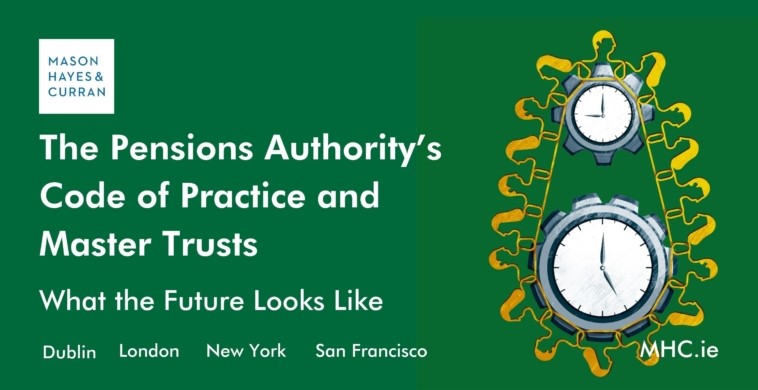What the Future Looks Like: The Pensions Authority’s Code of Practice and Master Trusts

The finalised Code of Practice for trustees of occupational pension schemes and trust retirement annuity contracts (Code) was published late last year after a consultation period that lasted eight weeks. Much of the discussion around the draft Code related to concerns about proportionality and investment restrictions. However, few anticipated the addition of an extra chapter relating entirely to defined contribution (DC) master trusts once the Code was finalised. The chapter builds on the findings of the Authority’s master trust engagement programme which took place in 2020.
Conflicts of Interest
The Code notes that master trusts will often be run for profit or have close connections to profit-making entities, such as life companies. The Authority expects trustees to pay particular attention to this risk and to manage potential conflicts of interest appropriately.
The appointment and removal of service providers is mentioned as an area that has potential for a conflict of interest where the consent of the founder is required. This concern relates to circumstances where the service providers are also companies within the founder’s group. The Code provides that trustees should have a set of minimum standards and agreed steps that will be taken when there is a breach of those standards. It states that any decision of the trustee board to remove or appoint a service provider must be an objective one, where the trustees are not inhibited or influenced by the relationship between the master trust and the founder.
Capitalisation
All DC master trusts must maintain sufficient capital to cover the running and wind-up costs of the scheme so that member benefits remain unaffected.
The Code provides that:
- Trustees must have access to sufficient capital until the latest period of projected self-sufficiency in the scheme’s continuity plan or until the scheme has already been self-sustaining for two years.
- Reserves equal to €70 per member must be maintained for the wind-up costs of the scheme. The reserve for running costs must at least equal the maximum need projected in the scheme’s continuity plan.
- A minimum reserve of €100,000 must be maintained by every master trust.
- Trustees must ensure ongoing compliance with the capitalisation requirements. Where these requirements are breached, a report must be made to the Authority and steps must be taken to remedy the breach.
The Trustee
The Code states that the trustee of a master trust must be incorporated as a Designated Activity Company (DAC) whose sole objective is acting as trustee for just one named master trust. The DAC must have two directors, at a minimum, with one independent director and an independent chairperson. The Code notes that an independent director/chairperson is someone who does not have an interest in the assets of the master trust and is not a shareholder of the trustee company or one of the scheme’s service providers.
All directors of the DAC must satisfy the ‘fit and proper’ requirements in the Code. This means that one director of the board must meet the qualification requirement with another director required to meet the experience requirement. Each director must have completed one of the trustee courses on the Authority’s website or been a trustee or director of a sole corporate trustee for two of the previous three years.
Continuity Plan
The Code confirms that all DC master trusts must have a continuity plan in place. The aim of the plan is to demonstrate the scheme’s viability to the Authority and will need to include projections for income and expenditure.
- Best estimate
- Unfavourable estimate, and
- Favourable estimate.
The plan must also provide details of the assumptions used in calculating the projections which must be to the Authority’s satisfaction. The plan must be reviewed yearly and where any changes are made, the updated plan must be submitted to the Authority with an explanation of the changes. As well as that, the directors of the trustee company must be able to show that they have reviewed the plan.
Communications
Master trusts are required to maintain a written policy on engagement with the employer and its members. The policy must include a commitment to engage with members, and the Code provides that this might occur by way of an annual meeting with employers and members.
Costs
The Code also notes that all employers and members must be able to understand the charges and costs levied. The trustee must put in place a written policy that specifies the charges and costs. The Authority must be satisfied that any charges applied by the master trust can be reasonably understood by members and employers. The written policy must also state that any increase in charges will only be made where six months’ notice is provided to members and employers to allow employers to transfer to another scheme if they wish.
Marketing
The Code provides that trustee consent needs to be required on the marketing approach being adopted for the scheme as well as on the marketing materials. The trustees must satisfy themselves that the materials are not misleading and do not create trustee obligations that cannot be met.
New members
Trustee consent is required for the enrolment of new members of the scheme. This is to ensure that the scheme has the capacity to provide for additional members. It will not be necessary for every member to be approved individually but this requirement can be managed as part of an overall strategy for the scheme.
Wind-up procedure
A written procedure for the wind-up of the scheme must be prepared. The procedure must allow for member benefits to be transferred efficiently and in a timely manner to other arrangements. The wind-up procedure must be kept up to date.
Conclusion
The requirements of the IORP II Directive and the likelihood that we will see auto-enrolment in some form over the next few years means that the master trust industry in Ireland will continue to grow, while small stand-alone schemes are wound-up and benefits transferred to master trusts. The potential for conflicts of interest remains, though the same issue occurs for stand-alone schemes and all occupational pension schemes must maintain a conflicts of interest policy. The Code can certainly be seen as overly prescriptive but, like the master trust, it is here to stay.
For more information, contact a member of our Employment & Benefits team.
The content of this article is provided for information purposes only and does not constitute legal or other advice.
Share this:




